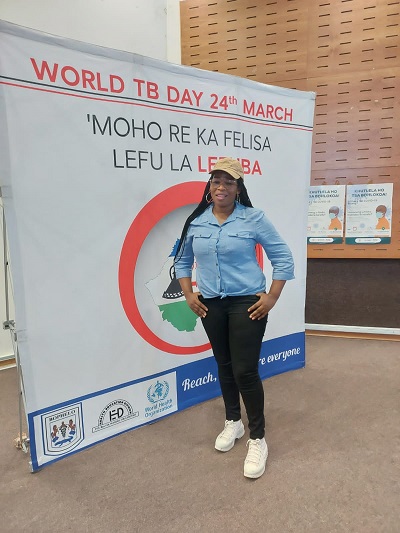“Despite its comparatively small population, Lesotho has the highest rate of TB in the world.”
By: Nothembabane Qechane
Maseru
On March 8th 2024 the Ministry of Health (MoH) through National Tuberculosis (TB) and Leprosy Program (NTLP) hosted a press conference at the Ministry’s auditorium, to raise awareness on (TB) burden in Lesotho, encourage action to prevent diseases and take part in relevant national response.
TB is a serious illness that mainly affects lungs. It is caused by a bacterium called mycobacterium tuberculosis. The bacteria usually attacks the lungs, but TB bacteria can attack any part of the body such as the kidney, spine and brain. While not everyone infected with TB bacteria become sick, it spreads when a person with the illness coughs, sneezes or actively breathes out in a labored way. This can put tiny droplets with the germs into the air and as the coughed air circulates within the proximity of others, this spreads. NTLP sensitizes the nation through the media about the forth coming world TB day to actively educate the nation about the disease.
NTLP Manager Dr Llang Maama, says that it is their responsibility to make sure that TB is known throughout the country. She confirms 661 incidents cases of every 100 000 Basotho, which is the highest rate compared to other countries. In 2023 Lesotho had a rate of 56% patients of TB, also infected by HIV/AIDS.
She say to the effect of health workers having knowledge, they also embrace World Health Organization (WHO) directive to launch Lesotho’s own guidelines that align with those of WHO. These were launched in 2023, allowing NTLP to adopt newly recommended treatment.
She says it is the responsibility of each and every one to participate on TB healing related activities, the first of which being campaigns hosted through the programme. This is how the NTLP reaches communities, contacting integrated services.
The goal is to end TB. Of the challenges worth noting is the inability to consistently reach and monitor patients and their healing progresses.
The second challenge she mentions is hunger, not only for TB patients but also for the nation. “Patients reject treatment because they do not have food. Malnutrition worsens TB treatment outcomes as it increases the risk of death.”
One of the members of TB programme Mafabia Maqalika, says TB can affect any and every one regardless of their social status or financial muscle. Being ill is about lack of knowledge about nutrition.
Another member of TB programme Mamosuoe Lephuthing adds more on the impact of lack of relevant information that the disease is strengthened and may evolve when tolerated without treatment.
The high rate of TB patients in Lesotho is a significant public health issue that requires a coordinated response from the government, health care providers, and communities. Basotho must be educated on the disease so as to save their lives and reduce the burden of this disease on the people of Lesotho.


